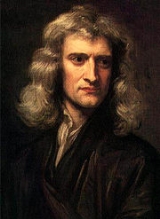Sir Isaac Newton PRSThe president of the Royal Society is the elected director of the Royal Society of London. After informal meetings at Gresham College, the Royal Society was founded officially on 15 July 1662 for the encouragement of ‘philosophical studies’, by a royal charter which nominated William Brouncker as...
(25 December 1642 – 20 March 1727 ) was an English
physicistA physicist is a scientist who studies or practices physics. Physicists study a wide range of physical phenomena in many branches of physics spanning all length scales: from sub-atomic particles of which all ordinary matter is made to the behavior of the material Universe as a whole...
,
mathematicianA mathematician is a person whose primary area of study is the field of mathematics. Mathematicians are concerned with quantity, structure, space, and change....
,
astronomerAstronomy is a natural science that deals with the study of celestial objects and phenomena that originate outside the atmosphere of Earth...
,
natural philosopherNatural philosophy or the philosophy of nature , is a term applied to the study of nature and the physical universe that was dominant before the development of modern science...
,
alchemistAlchemy is an influential philosophical tradition whose early practitioners’ claims to profound powers were known from antiquity. The defining objectives of alchemy are varied; these include the creation of the fabled philosopher's stone possessing powers including the capability of turning base...
, and
theologianTheology is the systematic and rational study of religion and its influences and of the nature of religious truths, or the learned profession acquired by completing specialized training in religious studies, usually at a university or school of divinity or seminary.-Definition:Augustine of Hippo...
, who has been "considered by many to be the greatest and most influential
scientistA scientist in a broad sense is one engaging in a systematic activity to acquire knowledge. In a more restricted sense, a scientist is an individual who uses the scientific method. The person may be an expert in one or more areas of science. This article focuses on the more restricted use of the word...
who ever lived."
His monograph Philosophiæ Naturalis Principia Mathematica, published in 1687, lays the foundations for most of
classical mechanicsIn physics, classical mechanics is one of the two major sub-fields of mechanics, which is concerned with the set of physical laws describing the motion of bodies under the action of a system of forces...
. In this work, Newton described universal gravitation and
the three laws of motionNewton's laws of motion are three physical laws that form the basis for classical mechanics. They describe the relationship between the forces acting on a body and its motion due to those forces...
, which dominated the scientific view of the physical
universeThe Universe is commonly defined as the totality of everything that exists, including all matter and energy, the planets, stars, galaxies, and the contents of intergalactic space. Definitions and usage vary and similar terms include the cosmos, the world and nature...
for the next three centuries.

![]()
![]()
![]()

